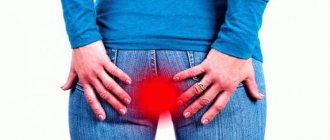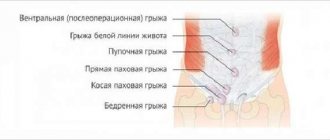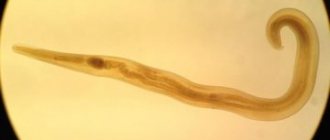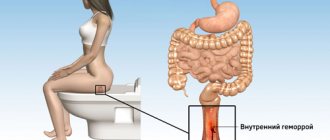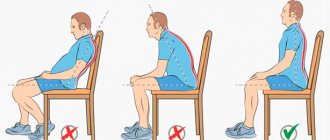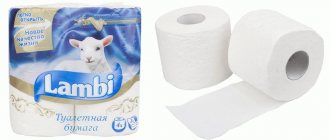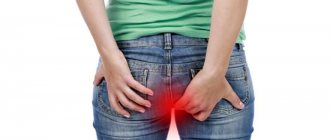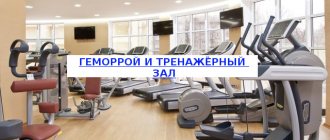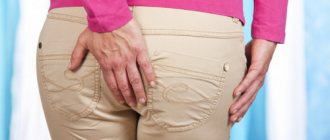Features of the disease and stage
Hemorrhoids are often compared to varicose veins in the legs. There are similarities between these diseases, the only difference is in localization. Hemorrhoids affect the anus area. Newly formed nodes complicate the act of defecation and cause a number of unpleasant sensations in the patient. These lumps can appear inside and outside the rectum.
Hemorrhoids are a disease that affects the veins in the anus or rectum
Over time, the pain becomes more intense, as the nodes expand significantly. The main cause of the disease is blood stagnation. There are 4 stages of hemorrhoids:
- first - a small amount of blood is released;
- second, knots fall out and need to be straightened out yourself;
- third - the loss of nodes becomes regular;
- fourth - it is impossible to move either hemorrhoids or the rectal mucosa into the anal canal.
This classification was developed in order to correctly select the treatment for each stage. Initially, conservative and sclerotherapy, infrared coagulation are prescribed. At the second stage, in addition to these methods, suture ligation and ligation with latex rings, as well as combined methods, can be used.
In more advanced situations, transanal resection of the mucosa is prescribed using the Longo method. It is possible to cure the disease through surgery. The last stage of the disease can only be cured through surgery.
Can the lower abdomen hurt and what other symptoms are there for hemorrhoids?
Hemorrhoids are a proctological disease that is associated with inflammation and enlargement of the internal rectal venous nodes. The main cause of pain is an inflammatory process that affects not only hemorrhoidal cones, but also the mucous membrane, nerves and vessels that lie in its thickness.
Why does bloating occur with hemorrhoids?
A faithful companion of hemorrhoids is constipation. Constipation is a pathological condition in which it is impossible to empty the intestines due to compaction of stool. Their appearance can be caused by several factors.
First of all, this is caused by a mechanical barrier in the form of an inflamed and enlarged hemorrhoid. An equally compelling reason is pain during bowel movements due to hemorrhoids.
The patient is afraid of painful sensations, so he independently delays bowel movements, thereby causing constipation.
Blockage of the intestinal lumen with solid feces leads to the inability to eliminate gases, the formation of which is normal. Their excessive accumulation in the intestines leads to a feeling of bloating.
Bloating is not only an unpleasant manifestation of hemorrhoids, but can also cause it to worsen. Several factors contribute to this:
- increased pressure in the abdominal cavity;
- poor circulation in the pelvis due to compression of blood vessels by an overly swollen intestine;
- the aggressive composition of gases irritates the affected intestinal mucosa.
Can the lower abdomen hurt with hemorrhoids?
Pain in the lower abdomen is characteristic of the internal form of hemorrhoids; with external types, a similar symptom rarely occurs.
In the early stages, unpleasant sensations appear only in the presence of chronic constipation, in later stages they occur when walking, exercising and sitting on hard surfaces.
Pain may be a sign of pathologies associated with hemorrhoids: paraproctitis, anal fissure, thrombosis of the intestinal veins.
Abdominal pain with hemorrhoids is accompanied by:
- feeling of a foreign body in the rectum and incomplete emptying after defecation;
- pain in the anus, radiating to the perineum and lower back;
- swelling of the anal tissue;
- the presence of dense hemorrhoidal cones;
- bloody discharge after defecation;
- itching and burning in the anus.
The following signs help to distinguish hemorrhoidal pain from signs of other pathologies:
- increased during defecation and prolonged sitting;
- pulsating character;
- aggravation with movements.
Unpleasant sensations in men and women in the lower abdomen with hemorrhoids appear due to:
- Injury to internal hemorrhoids. It occurs not only during defecation, but also under the influence of contractile movements of the intestine, pushing feces out of the anus. The pain in this case may radiate to the lower back and tailbone.
- Injury to inflamed mucous membranes with solid feces.
- Innervation. Pain impulses are transmitted along nerve fibers to organs that do not have pathological changes. The pain radiates from hemorrhoidal cones and subcutaneous tissue surrounding the intestine.
- Contact of the intestines with other abdominal organs. With constipation, the intestine expands and comes into contact with the uterus, ovaries, bladder or prostate gland. Abdominal pain appears during urination, physical activity, and sexual intercourse.
- Disturbances in the process of removing gases against the background of their increased formation.
Treatment should be aimed not only at eliminating the unpleasant symptom, but also at combating its cause - hemorrhoids.
For this, both conservative and surgical techniques are used.
The first include:
- Local agents (suppositories and ointments Relief, Posterizan, Proctosedyl). Eliminates the feeling of heaviness in the rectum, relieves signs of inflammation, and promotes the healing of cracks. Such drugs are effective only in the early stages of the disease.
- Antispasmodics (No-shpa, Papaverine). Eliminate smooth muscle spasm, which is the main cause of pain in the abdominal area, and normalize intestinal motility.
- Drugs that normalize the functioning of the gastrointestinal tract. These include enzymes (Mezim Forte), enterosorbents (Smectu), probiotics (Linex). Eliminate pathological conditions accompanied by a feeling of heaviness and pain in the intestines.
- Folk remedies (decoctions of chamomile, calendula, plantain). They have anti-inflammatory, anti-edematous and healing effects.
Doctors eliminate hemorrhoids, the presence of which leads to pain, using minimally invasive and surgical methods, including:
- Sclerotherapy. A drug is injected into the cavity of the hemorrhoidal node to promote fusion of the vessel walls. After the procedure, pain, discomfort, and the feeling of a foreign body in the anus disappear.
- Ligation. The leg of the node is tightened with a latex ring, which stops the blood supply. After 10-14 days, the cone dies and is rejected.
- Electrocoagulation. The leg of the node is exposed to an electric current, which promotes the sealing of blood vessels.
- Disarterization. This minimally invasive method involves ligating the arteries that supply the hemorrhoids.
- Hemorrhoidectomy. During the intervention, dilated areas of blood vessels are removed along with part of the mucosa, which eliminates relapse of the disease.
- Hemorrhoidopexy. The cones are pulled into the rectum, causing them to decrease in size.
- Why does the lower abdomen hurt with hemorrhoids?
- Medicine Smecta, instructions. Diarrhea, bloating, heartburn.
- Removal of hemorrhoids with laser
A person who has pain in the lower abdomen due to hemorrhoids should follow a diet that normalizes intestinal motility. Legumes, mushrooms, fatty meat broths, confectionery products, and spicy vegetables are excluded from the diet.
White bread is replaced with rye bread. Fresh vegetables and fruits, fermented milk products, and vegetable oils are added to the diet. Avoid alcohol, strong tea and coffee, which have an irritating effect.
The amount of liquid consumed per day is adjusted to 2 liters.
Causes of pain with hemorrhoids
The cause of pain lies in irritation of the nerve endings of the intestines or anus by hemorrhoids. As a result, a signal is sent to the brain, which is expressed as pain. The act of defecation and inflammation (infection) of the tissues surrounding the nodes can provoke and intensify pain.
As the disease progresses, the mucous membrane becomes thinner. As a result, the pain becomes stronger even from the slightest impact. Hemorrhoids are often accompanied by anal fissures. Their traumatization and repeated ruptures also cause pain. As a result, discomfort is felt constantly. It is observed when walking, in a sitting position, or during sudden action.
Other symptoms include itching, burning, swelling, redness, and foreign object sensation. Signs and their severity depend on the stage of the disease.
Pain often begins already at the stage of formation of internal hemorrhoids.
- In the second stage (we are talking about internal hemorrhoids), the nodes grow, which causes great pain. It becomes encircling in nature. There are cramps and sharp pains in the abdomen. The stool is disrupted (diarrhea and constipation alternate). Gas formation occurs.
- The third and fourth stages of development are accompanied by severe constant pain. Nodules may prolapse and bleeding may occur. Swelling and redness are observed.
In the external form of the disease, the pain is less pronounced, but it also intensifies when the pathology is advanced. In women, the pain intensifies during intercourse and during pregnancy (the uterus stretches and presses). In men - when urinating.
To relieve pain in internal hemorrhoids, suppositories and ointments are suitable. To relieve symptoms of an external problem - lotions, ointments, baths. Oral administration of decoctions and infusions is possible for a broad effect on the body. Or taking medications to relieve pain.
When treating internal nodes, it is optimal to use special ointments and suppositories
How to cope
In advanced stages in women and men with hemorrhoids, not only the anal area hurts, but the stomach, back, sacrum, tailbone, and lower back can also hurt. When such a symptom appears, a person should contact various specialists to diagnose the cause of the pathology:
- urologist or gynecologist;
- neurologist;
- orthopedist;
- proctologist;
- surgeon
This is due to the fact that pain can appear under the influence of any disease of the pelvic organs, spine and abdominal cavity.
If, after diagnostic procedures prescribed by the attending physician, no pathologies in adjacent areas of the body were identified, the resulting pain is considered a side effect of hemorrhoids. Therefore, to eliminate them, all the patient’s power should be aimed at removing hemorrhoidal pathology or at least at anesthetizing inflammation of the rectum.
Typically, painful inflammatory processes develop as a result of excessive physical activity or lifting heavy objects. It is worth considering that this lifestyle can in itself lead to the lumbar spine becoming inflamed and painful.
Therefore, treatment will consist of using rectal suppositories and ointments to eliminate hemorrhoidal inflammation, as well as a course of massage and transferring physical activity to a low level. Such manipulations in women and men will allow:
- reduce the spread of pain along nerve endings;
- warm up muscles and ligaments, normalizing their performance;
- normalize blood circulation in the sacral area;
- normalize the function of the gastrointestinal tract (eliminate constipation, reduce discomfort in the anal area during bowel movements);
- remove stagnation of venous blood in the lower body.
However, it is worth considering that a referral for massage for hemorrhoids is issued exclusively by a proctologist monitoring the patient. The doctor selects the optimal course of massage and also prescribes additional treatment in order to cope with pain faster and more effectively.
See a doctor urgently!
It is worth considering that you should never delay your visit to a doctor, since some pathologies require emergency medical intervention. If the following situations occur, you should immediately consult a doctor.
- The appearance of severe pain that spreads throughout the entire abdominal area or descends from top to bottom. Fever, feeling of weakness.
- The pain is accompanied by open bleeding from the anus.
- The painful sensations are constantly increasing and do not subside at night.
- The pain is characterized by a pulsating or bursting feature and is localized in the perineum, back and abdomen.
- The pain is sharp, there is no stool, blood and mucus are released from the anus.
- Painful sensations last constantly in the perineum and lower abdomen. Mucus mixed with pus or blood is released.
Such conditions of the body are caused by the development of dangerous diseases not related to hemorrhoids and require urgent medical intervention.
//.com/watch?v=818adW03bVQ
With hemorrhoids, the stomach, back and lower back may hurt due to the active development of physiological or mental factors. Usually this discomfort subsides after the inflammatory hemorrhoidal process is eliminated. Can my back or stomach hurt from hemorrhoids that are in the early stages of development? Definitely not.
This symptom appears under the influence of the development of concomitant diseases, many of which require surgical treatment, so you cannot postpone visiting a doctor.
Why does the lower abdomen hurt with hemorrhoids?
Unpleasant sensations and pain in the abdomen cannot be called the main signs of hemorrhoids, because these are symptoms of many diseases. This is not enough to make this diagnosis. But the presence of blood, mucus and itching in the anus indicates this unpleasant disease.
Let's consider the features of pain:
- significantly intensifies during the act of defecation or in a sitting position;
- with inflammation of the nodes and their loss, a feeling of pulsation may occur;
- at the last stage there is a sharp pain from almost any movement.
Unpleasant sensations during bowel movements are formed due to injuries to the hemorrhoids. More often this happens during constipation, since dry and hard feces strongly scratch the lump. In the final stages, the bulging becomes more pronounced. Even soft feces bring a feeling of discomfort to the patient.
Stomach pain due to hemorrhoids: causes and elimination of discomfort
Usually such a delicate problem as hemorrhoids is not accompanied by pain. The leading symptom of this disease is bleeding from the anus of varying severity.
For this reason, many patients, trying to understand why the lower abdomen hurts with hemorrhoids, are confused and often think that they have been given the wrong diagnosis. Despite widespread misconception, hemorrhoids can cause stomach pain, and in some patients the pain can be so severe that they have to call an ambulance. There are at least three main reasons why hemorrhoids can cause stomach pain.
No. 1: Inflammation of the hemorrhoidal node
A quite common complication of stage 3-4 external hemorrhoids. Due to constant trauma to the nodes with toilet paper and direct exposure to the environment, cracks form on the surface mucosa. They serve as entry points for infection.
Inflammation of the hemorrhoidal node can be suspected by the following symptoms:
- rapidly increasing pain in the anus, which can radiate to the tailbone and lower back;
- extremely painful knot when touched;
- increased body temperature;
- difficulty defecation.
The development of acute inflammation indicates an advanced process that requires urgent medical attention. If treatment is not started in time, paraproctitis , or suppuration of the fatty tissue surrounding the rectum.
No. 2: Thrombosis of hemorrhoids
This complication can occur with both external and internal hemorrhoids. In this case, the lumen of the cavernous bodies is thrombosed, and after a certain time the node dies (necrosis).
Unlike inflammation, thrombosis does not manifest itself immediately. Its first sign is an enlargement and thickening of one of the nodes , which is painless at first. As soon as blood access to the tissues is completely stopped, severe pain occurs, due to which the patient may lose consciousness. Soon the inflammatory process sets in, and the patient’s condition rapidly deteriorates.
Since hemorrhoids more often affect the stronger sex, thrombosis of the hemorrhoid is one of the serious causes of pain in the lower abdomen in men. Women are also susceptible to this disease, but practice shows that they are less likely to develop the disease to late stages.
No. 3: Changing the skin of the anus
All diseases of the rectum, including hemorrhoids, are accompanied by chronic hydration of the skin surrounding the anus. Because of this, the protective properties of the epidermis are sharply disrupted, painful ulcerations appear, alternating with areas of coarsening. Ultimately, a secondary infection joins this fertile ground.
This condition is known as perianal eczema (or dermatitis).
Sometimes it causes patients much more discomfort than hemorrhoids themselves, since it is accompanied not only by painful itching, but also by pain in various locations.
For example, women suffering from this disease often go to the doctor complaining of pain in the lower abdomen during sex.
Anal eczema is very difficult to treat. It is reliably known that any therapy will be ineffective until the main cause of dermatitis – hemorrhoids – is eliminated. After this, a comprehensive treatment is carried out, including baths, ointments, lotions with medicinal solutions and even general drug therapy.
How to cope with pain
You need to understand that the appearance of pain in the anal canal indicates advanced hemorrhoids that require surgical treatment . Fortunately, modern operations make it possible to remove nodular formations without any discomfort. You should consider surgical treatment in the following cases:
- the nodes are constantly located outside the rectum and cannot be reduced;
- bleeding has become more frequent and profuse (to the point that the entire toilet is stained with blood);
- each act of defecation is accompanied by increasing discomfort;
- Frequent abdominal pain appeared due to stool retention and pathological changes in the vessels of the rectum.
A good prevention of pain is suppositories, which soften the inflammatory process and slightly improve microcirculation. Very popular drugs are Procto-glivenol, Anestezol, Proctosedyl, Natalsid and others.
The range of suppositories for hemorrhoids is quite large; among them there are special agents with an anesthetic effect (for example, Anestezol). As a replacement for local medications, you can take any analgesic (ketorol, nimesulide, ibuprofen), but you should remember that with prolonged use, these medications can have a detrimental effect on the condition of the gastrointestinal tract and blood system.
Source: //zhivotu.net/bolit-zhivot-pri-gemorroe/
Lower abdominal pain: hemorrhoids or other causes
This unpleasant disease has many symptoms. Unpleasant sensations in the abdomen are not the only reason to suspect the presence of hemorrhoids.
But other diseases can provoke discomfort:
- diarrhea and constipation;
- inflammation of the uterus;
- flatulence;
- severe and sharp pain when an inguinal hernia is strangulated;
- Increasing pain may indicate appendicitis.
Can external hemorrhoids cause pain in the lower abdomen? No, but bumps on the last segment of the intestine will cause a lot of discomfort during bowel movements. Most often, the unpleasant sensations are constant, aching, which is associated with peristalsis. Removing congestion will help cure hemorrhoids, as well as avoid the appearance of new nodes, lumps and other bulges. We invite you to read reviews from people who have experienced abdominal pain - a warning sign of hemorrhoids:
Peter, 35 years old
“Office work provoked the development of hemorrhoids. For a long time I suffered from pain in the lower abdomen, blaming it all on poor nutrition. Later, problems with emptying began. I went to the doctor and it turned out that I had hemorrhoids. Fortunately, everything was fixed."
Anna, 23 years old
“For a long time I suffered from pain in the lower abdomen, attributing it to a disease of the genitourinary system, for which I was being treated. Alas, the painful sensations returned again and again. I consulted a proctologist only after bleeding appeared. The situation turned out to be not so critical, and the treatment was successful.”
Hemorrhoids symptoms
There are often situations when patients consider their problem shameful and visit a doctor with already advanced hemorrhoids. Moreover, they often confuse their pathology with other diseases, asking the doctor whether their stomach hurts due to hemorrhoids or if they have some other disease. That is why it is important to know the main symptoms of hemorrhoids:
- first of all, the disease reveals itself as a feeling of discomfort, heaviness in the anus when sitting, painful sensations during bowel movements (the stomach may hurt);
- Itching and burning in the anus are not uncommon;
- As hemorrhoids develop, they are accompanied by the appearance of blood in the stool, which indicates bleeding from the nodes inside or outside.
If you observe one or more of the above symptoms, it would be a good idea to consult a doctor and undergo all the necessary examinations.
Also, patients often ask, is it true that the lower abdomen can hurt due to hemorrhoids? Yes, and the pain of such a localization indicates some degree of advanced disease or the location of the pathology inside the rectum. Indeed, with external hemorrhoids, pain is more often observed in the lower back (due to the spread of the pain signal to neighboring organs) or the anus. A common mistake with such complaints is the assumption of problems in the digestive system. Although this is a “bell” indicating the development of hemorrhoids, without treatment of which the pain will not go away on its own.
